SOPAC Quarterly News January - April 2011
Thursday, 25 August 2011 12:26
administrator
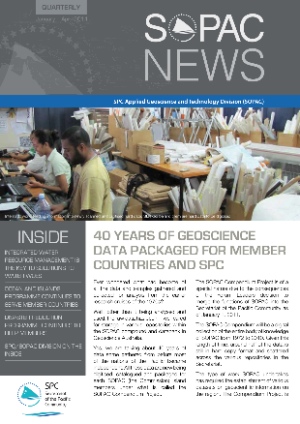 Inside Inside
1. 40 years of Geoscience data packaged for Member countries and SPC.
2. Integrated Water resource Management Is the Key to solutions to Water Woes.
3. Ocean and Islands Programme continues to serve Member countries.
4. Disaster Reduction Programme continues to help Members.
5. SPC/SOPAC Division on the Inside.
Download Newsletter | Read Online
Last Updated on Thursday, 25 August 2011 12:43
Cook Islands Show The Way at Pacific Disaster Platform
Thursday, 18 August 2011 13:05
administrator
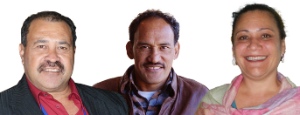
In common with many Pacific island countries, the Cook Islands face the effects of climate change and natural hazards and disasters such as tsunamis, droughts, fires and cyclones, all of which have the potential to cause set backs to economic, social and cultural development.
Two hundred delegates and experts, from 22 Pacific island countries and territories and around the world, met at the 3rd Session of the Pacific Platform for Disaster Risk Management to examine ways to mitigate the impact of disasters, including the impacts of climate change, on Pacific regional development.
Last Updated on Thursday, 18 August 2011 13:11
Read more...
Seabed can be ‘safely’ mined: scientist
Friday, 12 August 2011 15:34
administrator
As environmental concerns heat up amid growing interest in minerals exploration and mining of the Pacific ocean’s seabed, one scientist is advocating the search for more inactive hydrothermal vents as a way of safely mining the sea.
Dr Sven Peterson, a minerologist at the Leibniz Institute of Marine Sciences (IFM-GEOMAR) in Germany, said inactive vents were less likely to host marine life, so mining them would pose lesser danger to the ocean’s ecosystems.
“At water depths of 500 to 5000 metres which the mining industry will be interested in, there is no light but we still see oases of life there. This, of course, is of concern among biologists who do not want mining to happen at these oases in the deep.
Last Updated on Friday, 12 August 2011 15:42
Read more...
Disaster Meeting Shows "Way Forward"
Friday, 12 August 2011 11:12
administrator
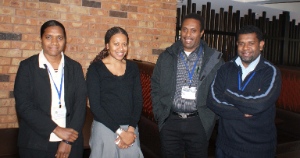 Two hundred delegates from 22 island countries and territories in the Pacific region met with experts from around the world at the 3rd Session Pacific Platform for Disaster Management to examine “a way forward” to reduce the risks of disasters including the impacts of climate change that are affecting development in the Pacific Region. Two hundred delegates from 22 island countries and territories in the Pacific region met with experts from around the world at the 3rd Session Pacific Platform for Disaster Management to examine “a way forward” to reduce the risks of disasters including the impacts of climate change that are affecting development in the Pacific Region.
It was the largest gathering to have ever participated in the Pacific Platform, reflecting the growing concern within the region of the “constant reminders” of the vulnerability of the island countries following recent events citing cyclones, flooding, earthquakes, tsunamis and droughts.
Last Updated on Friday, 12 August 2011 11:23
Read more...
|
Managing Risk Now A Priority In The Pacific
Wednesday, 24 August 2011 14:00
administrator
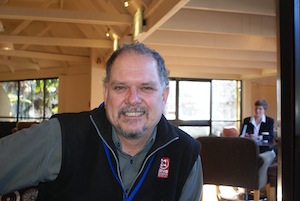 Pacific Island nations can now access information that could change their response to the threat of natural hazards, and indicate options for managing the financial burden of disasters. Pacific Island nations can now access information that could change their response to the threat of natural hazards, and indicate options for managing the financial burden of disasters.
The Pacific Catastrophe Risk Assessment and Financing Initiative, a two-year project, has resulted in “the most comprehensive set of data ever collected within the Pacific Islands.”
“I would like to see the available data to be implemented in Pacific Island Governments for everyday processes, whether it be for asset management, building standards and controls, planning, or monitoring the impact of disasters,” said consulting scientist Phil Glassey, Head of Regional Geology Department, GNS Science New Zealand.
Last Updated on Wednesday, 24 August 2011 14:04
Read more...
Caribbean and Pacific Regions Work To Reduce Disasters
Sunday, 14 August 2011 14:11
administrator
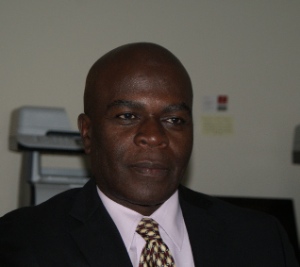 Common threats based on similar geography and vulnerabilities of small islands, has been a major influence on the increased cooperation between the Caribbean and Pacific Regions. Common threats based on similar geography and vulnerabilities of small islands, has been a major influence on the increased cooperation between the Caribbean and Pacific Regions.
Two of the major players in this developing relationship are SOPAC, a division of SPC, and CDEMA (Caribbean Disaster Emergency Management Agency).
The Executive Director of CDMEA, Jeremy Collymore has been instrumental in fostering the exchanges between the two regions. that have led to a growing recognition of the range of learning capabilities, and practices for improving effective disaster prevention and management at the national level.
Last Updated on Thursday, 18 August 2011 13:12
Read more...
Fiji benefits from disaster breakthrough
Friday, 12 August 2011 16:13
administrator
Fiji is among countries that will be the first to benefit from state-of-the art techniques that allow them to assess risks from natural disasters such as earthquakes and tropical cyclones.
These techniques provided under the joint Pacific Catastrophe Risk Assessment and Financing Initiative (PCRAFI) will assist the Ministry of Finance and the National Disaster Management Office in risk modelling and risk profiling, which in turn will help government draw up risk reduction measures.
Last Updated on Thursday, 18 August 2011 13:13
Read more...
Howorth naming boosts Fiji
Thursday, 11 August 2011 12:10
administrator
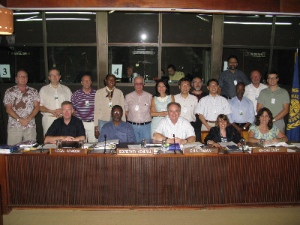 Dr Russell Howorth, Director of the Suva-based Applied Geoscience and Technology Division (SOPAC) of the Secretariat of the Pacific Community (SPC) has been appointed to the Legal and Technical Commission of the International Seabed Authority (ISA). Dr Russell Howorth, Director of the Suva-based Applied Geoscience and Technology Division (SOPAC) of the Secretariat of the Pacific Community (SPC) has been appointed to the Legal and Technical Commission of the International Seabed Authority (ISA).
The ISA has been mandated with signatories of 162 countries to manage the mineral resources of the international seabed beyond national jurisdiction.
Last Updated on Thursday, 18 August 2011 13:13
Read more...
|
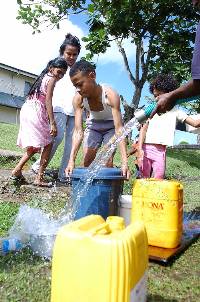 RAINWATER can be a good supplement to the country's water needs if tapped into and used effectively. It is useful and free but a highly under utilised freshwater resource, especially in cities and towns. But a large proportion of people living in rural areas and outer islands have their own rainwater tanks for water supply.
RAINWATER can be a good supplement to the country's water needs if tapped into and used effectively. It is useful and free but a highly under utilised freshwater resource, especially in cities and towns. But a large proportion of people living in rural areas and outer islands have their own rainwater tanks for water supply.


 Inside
Inside
 Two hundred delegates from 22 island countries and territories in the Pacific region met with experts from around the world at the 3rd Session Pacific Platform for Disaster Management to examine “a way forward” to reduce the risks of disasters including the impacts of climate change that are affecting development in the Pacific Region.
Two hundred delegates from 22 island countries and territories in the Pacific region met with experts from around the world at the 3rd Session Pacific Platform for Disaster Management to examine “a way forward” to reduce the risks of disasters including the impacts of climate change that are affecting development in the Pacific Region. Pacific Island nations can now access information that could change their response to the threat of natural hazards, and indicate options for managing the financial burden of disasters.
Pacific Island nations can now access information that could change their response to the threat of natural hazards, and indicate options for managing the financial burden of disasters.  Common threats based on similar geography and vulnerabilities of small islands, has been a major influence on the increased cooperation between the Caribbean and Pacific Regions.
Common threats based on similar geography and vulnerabilities of small islands, has been a major influence on the increased cooperation between the Caribbean and Pacific Regions. Dr Russell Howorth, Director of the Suva-based Applied Geoscience and Technology Division (SOPAC) of the Secretariat of the Pacific Community (SPC) has been appointed to the Legal and Technical Commission of the International Seabed Authority (ISA).
Dr Russell Howorth, Director of the Suva-based Applied Geoscience and Technology Division (SOPAC) of the Secretariat of the Pacific Community (SPC) has been appointed to the Legal and Technical Commission of the International Seabed Authority (ISA).








